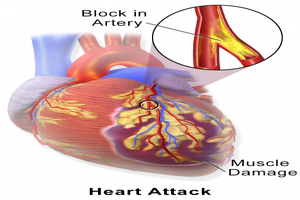- Home
- Editorial
- News
- Practice Guidelines
- Anesthesiology Guidelines
- Cancer Guidelines
- Cardiac Sciences Guidelines
- Critical Care Guidelines
- Dentistry Guidelines
- Dermatology Guidelines
- Diabetes and Endo Guidelines
- Diagnostics Guidelines
- ENT Guidelines
- Featured Practice Guidelines
- Gastroenterology Guidelines
- Geriatrics Guidelines
- Medicine Guidelines
- Nephrology Guidelines
- Neurosciences Guidelines
- Obs and Gynae Guidelines
- Ophthalmology Guidelines
- Orthopaedics Guidelines
- Paediatrics Guidelines
- Psychiatry Guidelines
- Pulmonology Guidelines
- Radiology Guidelines
- Surgery Guidelines
- Urology Guidelines
New Blood test may predict coronary artery blockage and heart attack risk

No stress echo or treadmill testing.A new Blood test may reveal extent of blocked arteries and predict heart attack risk in future, according to researchers. A blood test could show whether arteries carrying blood to the heart are narrow or blocked, a risk factor for heart disease finds a Duke Health pilot project .The study has been published in the journal PLOS ONE.
“Cardiologists do a stress test to determine who’s at risk for having heart disease,” said lead author Alexander T. Limkakeng Jr., M.D., lead author of the study and an associate professor of emergency medicine at Duke. “It guides them on whether they need a more invasive study like a catheterization. Augmenting the imaging of a stress test with metabolite biomarkers could make that process more accurate or more efficient.”
Previous research has suggested that metabolites could indicate heart disease, but scientists have yet to uncover the specific metabolomic signature to look for. For the Duke study, scientists evaluated the presence of more than 60 chemicals or compounds in the blood to identify the five specific metabolites that appeared to change in patients with abnormal cardiac stress tests.
According to the 40-person study,emergency patients who underwent a treadmill stress test and showed signs of decreased blood flow to the heart also had changes in five metabolites in their blood within two hours.A control group of patients with normal stress tests did not show the same metabolite changes.
All study subjects had gone to the emergency department with symptoms of coronary disease, such as chest, jaw and shoulder pain.
The researchers hope a larger study could confirm that acute changes in these fatty acid and amino acid metabolites, which are energy sources for cells, could be an early biological indicator of restricted blood flow that could complement or even replace current tests.
The researchers hope to begin a larger study to further test this approach to detecting coronary artery disease, they said.

Disclaimer: This site is primarily intended for healthcare professionals. Any content/information on this website does not replace the advice of medical and/or health professionals and should not be construed as medical/diagnostic advice/endorsement or prescription. Use of this site is subject to our terms of use, privacy policy, advertisement policy. © 2020 Minerva Medical Treatment Pvt Ltd